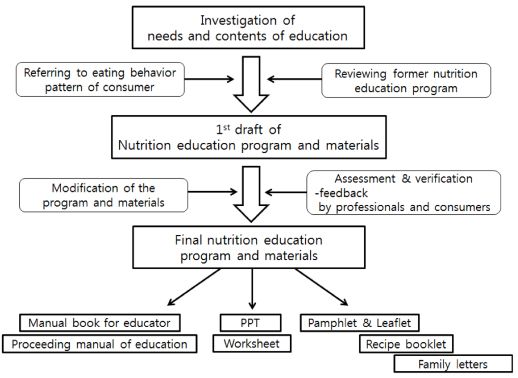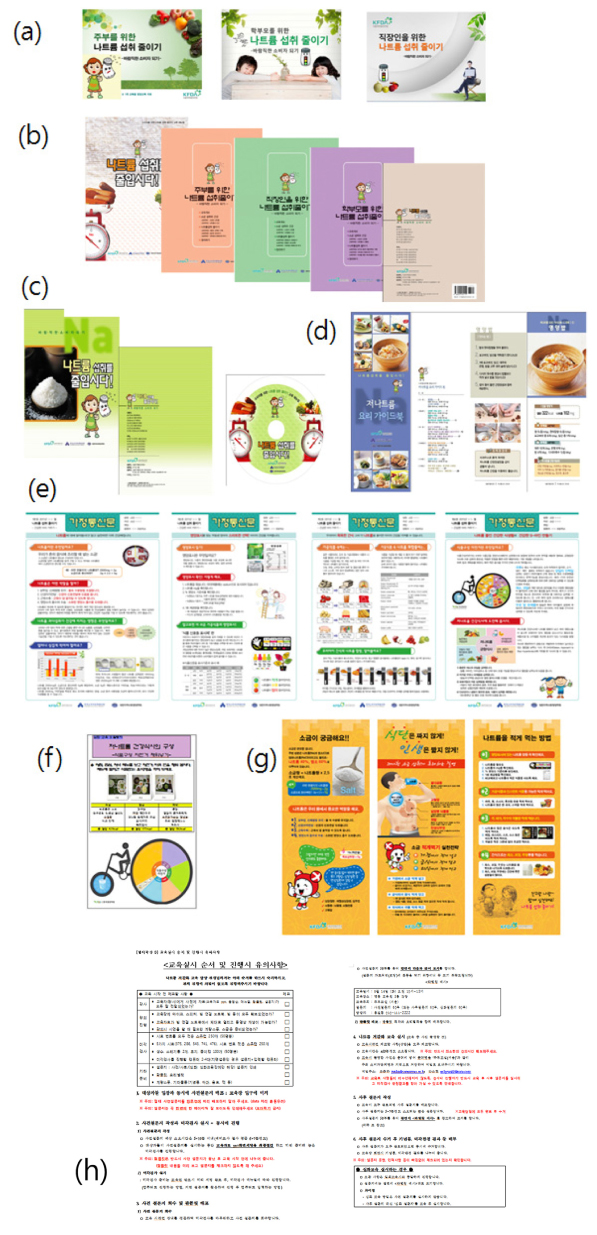Korean J Community Nutr.
2014 Aug;19(4):342-360. 10.5720/kjcn.2014.19.4.342.
Development of Nutrition Education Program for Consumers to Reduce Sodium Intake Applying the Social Cognitive Theory: Based on Focus Group Interviews
- Affiliations
-
- 1Department of Food Science and Nutrition, Catholic University, Bucheon, Korea.
- 2Department of Food and Nutrition, Baewha Women's University, Seoul, Korea.
- 3Department of Food and Nutrition, Keimyung University, Taegu, Korea.
- 4Department of Food and Nutrition, Shingu College, Songnam, Korea. jskwon@shingu.ac.kr
- KMID: 2268085
- DOI: http://doi.org/10.5720/kjcn.2014.19.4.342
Abstract
OBJECTIVES
This study aimed to develop nutrition education program for consumers to reduce sodium intake based on social cognitive theory (SCT).
METHODS
The main factors of SCT related to low sodium diet were investigated by using focus group interview (FGI) with 30 women who participated in consumer organizations.
RESULTS
The main target groups for the education program were housewives (H), parents (P), and the office workers (OW), for which we considered their influences on other people and the surroundings. According to the results of FGI, in carrying out low sodium diet, 'positive outcome expectation' were prevention of chronic disease and healthy dietary habit, and 'negative outcome expectation' were low palatability of foods, difficulty in cooking meals, and limited choice of foods. The contents of the program and education materials were individualized by each group to raise self-efficacy and behavioral capability, which reflected the results of the FGI. The program included 'salt intake and health' to raise positive outcome expectation. For improving the ability to practice low-sodium diet, the program contained the contents that focused on 'cooking' and 'food purchasing' for H, on 'purchasing and selection of low-sodium food with the children' for P, and on 'way of selecting restaurant menu' for OW. Also the program included 'way of choosing the low-sodium foods when eating out' with suggestions on sodium content of the dishes and snacks. Further, 'dietary guidelines to reduce sodium intake' was also suggested to help self-regulation.
CONCLUSIONS
This nutrition education program and education materials could be utilized for the community education and provide the basis for further consumer targeted education program for reducing sodium intake.
Keyword
MeSH Terms
Figure
Reference
-
1. Ahn SH, Kwon JS, Kim K, Yoon JS, Kang BW, Kim JW, Heo S, Cho HY, Kim HK. Study on the eating habits and practicability of guidelines for reducing sodium intake according to the stage of change in housewives. Korean J Community Nutr. 2012; 17(6):724–736.2. Bandura A. Social cognitive theory of mass communication. Media Psychol. 2001; 3(3):265–299.3. Bandura A. Social cognitive theory in cultural context. Appl Psychol. 2002; 51(2):269–290.4. Bandura A. Health promotion by social cognitive means. Health Educ Behav. 2004; 31(2):143–164.5. Blaustein MP, Hamlyn JM. Role of a natriuretic factor in essential hypertension: an hypothesis. Ann Intern Med. 1983; 98(5 pt 2):785–792.6. Boyle MA, Morris DH. Community nutrition in action: an entrepreneurial approach. 2nd ed. Belmont (CA): Wadsworth Pub. Co.;1999.7. Chobanian AV, Hill M. National heart, lung, and blood institute workshop on sodium and blood pressure: a critical review of current scientific evidence. Hypertension. 2000; 35(4):858–863.8. Anderson ES, Winett RA, Wojcik JR. Self-regulation, self-efficacy, outcome expectations, and social support: Social cognitive theory and nutrition behavior. Ann Behav Med. 2007; 34(3):304–312.9. Glanz K, Rimer BK, Viswanath K. Three: the health belief model. In : Champion VL, Skinner CS, editors. Health behavior and health education: theory, research, and practice. 4th ed. San Francisco (CA): Joseey-Bass;2008. p. 45–62.10. Glanz K, Lewis FM, Romer BK. 1. The scope of health promotion and health education. In : Glanz K, Lewis FM, Romer BK, editors. Health behavior and health education: theory, research, and practice. 2nd ed. San Francisco (CA): Jossey-Bass Publishers;1997. p. 3–18.11. Hearn MD, Baranowski T, Baranowski J, Doyle C, Matthew S, Lin LS, Resnicow K. Environmental influences on dietary behavior among children: availability and accessibility of fruits and vegetables enable consumption. J Health Educ. 1998; 29(1):26–32.12. Huh GY. Risk factor analysis of hypertension and development of FFQ and nutrition education program. The Catholic University of Korea;2003. 120–148. Dissertation.13. Chung EJ, Shim E. Salt-related dietary behaviors and sodium intakes of university students in Gyeonggi-do. J Korean Soc Food Sci Nutr. 2008; 37(5):578–588.14. Jung YY, Shin EK, Lee HJ, Lee NH, Chun BY, Ann MY, Lee YK. Development and evaluation of a nutrition education program on sodium reduction in elementary school students. Korean J Community Nutr. 2009; 14(6):746–755.15. Jung EJ, Son SM, Kwon JS. The effect of sodium reduction education program of a public health center on the blood pressure, blood biochemical profile and sodium intake of hypertensive adults. Korean J Community Nutr. 2012; 17(6):752–771.16. Chapman-Novakofski K, Karduck J. Improvement in knowledge, social cognitive theory variables, and movement through stages of change after a community-based diabetes education program. J Am Diet Assoc. 2005; 105(10):1613–1616.17. Kim S. A baseline study on housewife-consumer education in the information society. Korean J Hum Ecol. 2004; 13(3):425–440.18. Kim HH, Shin EK, Lee HJ, Lee NH, Chun BY, Ahn MY, Lee YK. Evaluation of the effectiveness of a salt reduction program for employees. Korean J Nutr. 2009; 42(4):350–357.19. Kim YS, Lee MJ. Effects of nutrition education through social cognitive theory in elementary school students -Focusing on the nutrition education of sugar intake-. Korean J Food Nutr. 2011; 24(2):246–257.20. Son SM. A symposium of reducing sodium intake. Cheongju: Korea Food and Drug Administration; Korea Health Industry Development Institute;2010. p. 7–12.21. Korea Food and Drug Administration. Healthy menu with reduced sodium. 2014. cited June 20, 2014. Available from http://www.foodnara.go.kr/lowna/index.do.22. Korea Food and Drug Administration. Headquarters of reducing sodium intake. 2014. cited June 20, 2014. Available from http://www.foodnara.go.kr/Na_down/res/contents/natrium1.jsp.23. Lee Y, Park HN. The effectiveness of na education program in elementary school: six month follow-up study. Korean J Community Nutr. 2010; 15(5):603–613.24. Lennie TA, Worrall-Carter L, Hammash M, Odom-Forren J, Roser LP, Smith CS, Trupp R, Chung ML, Moser DK. Relationship of heart failure patients' knowledge, perceived barriers, and attitudes regarding low-sodium diet recommendations to adherence. Prog Cardiovasc Nurs. 2008; 23(1):6–11.25. Mansyur CL, Pavlik VN, Hyman DJ, Taylor WC, Coodrick GK. Self-efficacy and barriers to multiple behavior change in low-income African Americans with hypertension. J Behav Med. 2013; 36(1):75–85.26. Miller CK, Edwards L, Kissling G, Sanville L. Evaluation of a theory-based nutrition intervention for older adults with diabetes mellitus. J Am Diet Assoc. 2002; 102(8):1069–1081.27. Ministry of Health and Welfare, Korea Centers for Disease Control and Prevention. Korea Health Statistics 2011: Korea National Health and Nutrition Examination Survey (KNHANES V-2). Cheongwon: Korea Centers for Disease Control and Prevention;2012.28. Moon EH, Kim KW. Evaluation of nutrition education for hypertension patients aged 50 years and over. Korean J Community Nutr. 2011; 16(1):62–74.29. Mori K, Suzuki H, Wang DH, Takaki J, Takigawa T, Ogino K. Relationship of psychological factors with physical activity stage of change in prime-and middle-aged Japanese. Acta Med Okayama. 2009; 63(2):97–104.30. Park N, Sohn S. The effects of food safety education on children's food safety knowledge, belief, attitude, and behavior. Consum Policy Educ Rev. 2010; 6(1):47–66.31. Park S, Kwon JS, Kim CI, Lee Y, Kim HK. Development of nutrition education program for hypertension based on health belief model, applying focus group interview. Korean J Community Nutr. 2012; 17(5):623–636.32. Sallis JF, Glanz K. Physical activity and food environments: solutions to the obesity epidemic. Milbank Q. 2009; 87(1):123–154.33. Sheahan SL, Fields B. Sodium dietary restriction, knowledge, beliefs, and decision-making behavior of older females. J Am Acad Nurse Pract. 2008; 20(4):217–224.34. Silverman D. Doing qualitative research. 3rd ed. London: SAGE;2010.35. Son SM, Park YS, Lim WJ, Kim SB, Jeong YS. Development and evaluation of validity of short dish frequency questionnaire (DFQ) for estimation of habitual sodium intake for Korean adults. Korean J Community Nutr. 2007; 12(6):838–853.36. Son SM, Lee KH, Kim KW, Lee YK. Social cognitive theory. Nutrition education and counseling. Seoul: Lifescience;2007. p. 19–25.37. Winett RA, Anderson ES, Wojcik JR, Winett SG, Bowden T. Guide to health: nutrition and physical activity outcomes of a group-randomized trial of an internet-based intervention in churches. Ann Behav Med. 2007; 33(3):251–261.38. Yim KS. The effects of a nutrition education program for hypertensive female elderly at the public health center. Korean J Community Nutr. 2008; 13(5):640–652.39. Yoo T, Yoo HR. Part two: models of Individual health behavior. Health behavior and health education: theory, research, and practice. 3rd ed. Seoul: Koonja;2009. p. 43–69. English written by Glanz K, Rimer BK, Lewis FM.40. Yoon HS, Lee H, Lee SK. Factors associated with the use of health promotion program -Seoul community health center-. Health Soc Welf Rev. 2008; 28(2):157–184.41. Zhang J, Xu AQ, Ma JX, Shi XM, Guo XL, Engelgau M, Yan LX, Li Y, Li YC, Wang HC, Lu ZL, Zhang JY, Liang XF. Dietary sodium intake: knowledge, attitudes and practices in Shandong Province, China, 2011. PLoS One. 2013; 8(3):e58973.
- Full Text Links
- Actions
-
Cited
- CITED
-
- Close
- Share
- Similar articles
-
- Evaluation of Consumer Nutrition Education Program to Reduce Sodium Intake Based on Social Cognitive Theory
- Development and evaluation of a nutrition education program for housewives to reduce sodium intake: application of the social cognitive theory and a transtheoretical model
- Development of a Food Safety and Nutrition Education Program for Adolescents by Applying Social Cognitive Theory
- Factors affecting sugar intake in adults based on the social cognitive theory
- The Development of a Nutrition Education Program for Low-income Family Children by applying the Social Cognitive Theory and Health Belief Model



